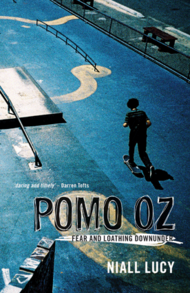AUTHOR INTERVIEW: Lucy’s fear and loathing

Author interview with Niall Lucy.
In your book Pomo Oz: Fear and Loathing Downunder, you respond to a misrepresentation of postmodern thought in the public sphere. Do you think a definition of ‘postmodernism’ is possible, or even necessary?
For postmodernism (and I’m happy to call this a definition), definitions and interpretations aren’t exactly opposed to one another. This gets misrepresented – often deliberately – to mean that postmodernism says that definitions aren’t true, because there’s no such thing as truth! But in fact no one who might be called a ‘postmodernist’ has ever said this; it’s a complete fiction, albeit one that carries a lot of force in many circles, the point of which is to make it seem that postmodernism is seriously loopy and ultimately very dangerous.
One of my main concerns in the book has to do with the sorts of interests that might be served by misrepresenting postmodernism in this way. A quick example: if you’re a politician – the federal minister for education, say – and you claim that ‘postmodernism’ is responsible for declining education standards, then I guess you’ve served the interest of distracting people’s attention from gross inequities in the system, especially in the form of under-resourced public schools. By joining in with the media in attacking teachers for welcoming pomo into the classrooms of the nation, you never have to deal with those inequities.
This leaves your government with heaps more money for bailing out the high end of the financial sector, for which the only crisis that matters isn’t declining education standards but the threat of declining corporate profits.
If it weren’t for ‘postmodernism’, then, you might actually have to spend money on education instead.
You are making serious points, but often write with tongue firmly in cheek. What role do you see humour/irony playing in this book?
To laugh at something (and I never laugh at spiders or vampires, for instance) shows that you’re not frightened of it, that you don’t recognise its authority. So the mode of address I adopt in the book plays no less an important role than the arguments I make; in fact the arguments depend on striking a certain tone or attitude such that style and content, if you like, overlap in various ways, and that’s very much an effect I was aiming for.
How do you apply the idea of democracy to contexts such as media coverage and English teaching?
The idea of democracy, which can’t be reduced to a system of government, depends on a certain critical vigilance. To the extent that the media and English teaching are questioning rather than accepting of authority, then they’re on the side of democracy because they promote a critical attitude.
But it’s very hard to say anything specific about such huge abstractions. The media, for instance, isn’t a giant monolith: something whose parts include Miranda Devine and The Chaser’s War on Everything could be neither fully conservative nor fully progressive.
Explain your use of the extended footnote in the chapter on Derrida, ‘Running On/BORDER LINES’
Well it’s not a footnote, exactly. It runs, as it were, silently underneath the text that’s above it; or the two run in parallel lines, oblivious to one another. Yet they also constitute a single text, albeit one that’s riven or dislocated. One of several points that might be inferred from this is that textual unity is something of an illusion.
We tend to think of a text as something that’s identical with ‘itself’, but the problem here, in this particular chapter, has to do with the very location of an ‘itself’. The words we normally use to describe a text don’t quite work in relation to this chapter, and so I guess we’re posed the question of having to find some other way of accounting for its identity. But this is also a question for the concept of identity in general, and especially for Australian identity. What does it mean to be downunder, antipodean, below the surface of the ‘real’ world: a footnote to Europe?
I guess the point is that we don’t think of identity as multiple; we think of it as unitary. So in order to have an identity – an ‘Australian’ identity, say – we have to own it to the exclusion of others, and we have to protect it from invasion and contamination by others. You can see where I’m going with this….
In short, the concept of unitary or singular identity is potentially violent and undemocratic. That doesn’t mean we should abandon the concept of identity; it just means we should try to think identity differently.
Identities, then, like definitions, aren’t naturally occurring things. One of the examples I use in the book (working from a couple of John Kinsella poems) is the echidna, whose identity is taken to be ‘monstrous’ simply because the definition of mammalian identity excludes egg-laying creatures. But in so far as that’s a definition, it’s also the expression of a position or a perspective. Because, from the echidna’s point of view, the monsters are the mammals who don’t lay eggs!


